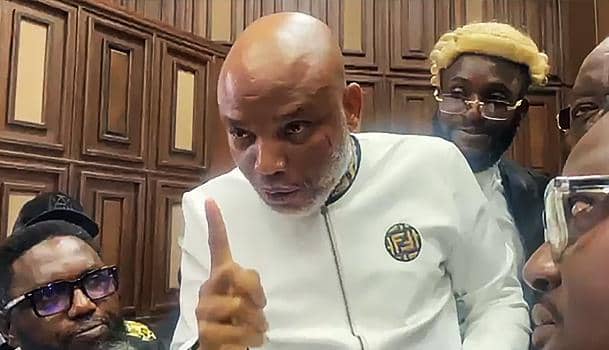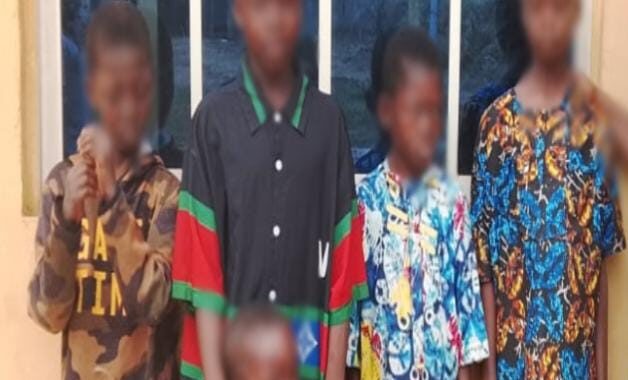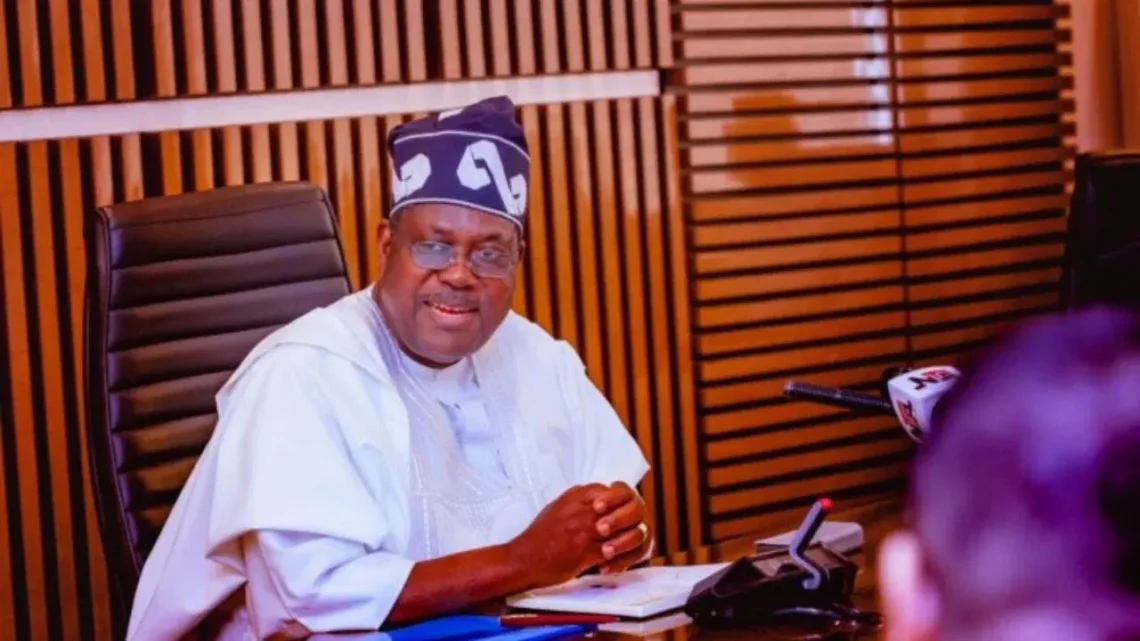The Federal High Court in Abuja on Thursday rejected the evidence sought to be tendered by the Federal Government in the ongoing trial of Nnamdi Kanu, leader of the proscribed Indigenous People of Biafra (IPOB).
Justice James Omotosho, in a ruling, agreed with the argument of the defence counsel, Paul Erokoro, SAN, that the Supreme Court had ruled that in extracting an extrajudicial statement from a suspect, the presence of his lawyer is mandatory.
Justice Omotosho held that though a provision of the Administration of Criminal Justice Act (ACJA), 2015, used the word “may” to mean that “the presence of a lawyer to a suspect is not a must while making a statement”, he could not close his eyes to the apex court’s decision.
The News Agency of Nigeria (NAN) earlier reported that the judge stood down the matter to deliver a ruling on the admissibility of the evidence sought to be tendered by the Federal Government.
The development occurred after FG’s counsel, Suraj Saida, SAN, and Kanu’s lawyer, Paul Erokoro, SAN, adopted their written addresses and argued their case for and against the propriety of the evidence.
Ruling after the trial-within-a-trial, Justice Omotosho held that the issue is whether, with regard to the evidence placed before the court, the statements of Nnamdi Kanu were admissible in law.
He said the burden of proof in a trial-within-a-trial is on the prosecution to prove its case.
The judge said, in the mind of the court, the defendant did not establish the allegations of involuntariness in any way.
He said the video recordings showed that Nnamdi Kanu was relaxed when he was interviewed by the Department of State Services (DSS) operatives.
He said a look at the video and the statements showed that they were the same.
However, the judge said the court must not close its eyes to the fact that Kanu repeatedly said in the video that his statements were taken without his lawyers.
He held that relevant laws state that under Section 17(2) of ACJA, the statements of a defendant may be taken in the presence of a legal practitioner of his choice or, where he has no counsel, an official of the Legal Aid Council shall be present.
Omotosho, however, added that the Supreme Court had ruled several times that the presence of a lawyer for a defendant when he is making his confessional statements is “mandatory”.
He said security agencies must comply with the relevant laws which mandate the presence of a defendant’s lawyer, highlighting that it is “tied to the fundamental right” of every Nigerian.
Justice Omotosho said the charge against Kanu was a grievous one, requiring the presence of the suspect’s lawyer during the recording of the statements.
The judge held that for a video recording to survive in a criminal trial, it must show that a suspect’s lawyer was present.
“The statements are inadmissible in light of this omission by the prosecution,” Omotosho said.
He held that the 2015 statements obtained from Nnamdi Kanu are inadmissible in law due to the absence of his lawyers.
The judge, subsequently, expunged the video evidence and statements obtained from Nnamdi Kanu on these grounds.
“The objection of the defendant’s counsel is upheld.
“The statements of October 23, 2015, and November 2015, earlier admitted in evidence, are rejected,” the judge said.
Justice Omotosho proceeded to mark the statements rejected and also expunged, from the court’s record, the video recordings of the interview/statement writing sessions that Kanu had with DSS officials in October 2015.
NAN observes that the video recordings were earlier admitted in evidence by the court during Wednesday’s proceedings and marked: Exhibits PWQ and PWR.
Justice Omotosho, on Wednesday, ordered a trial-within-a-trial following Kanu’s rejection of the extra-judicial statements sought to be tendered by the prosecution.
The IPOB leader had alleged that the statements were made by him under duress.
Kanu alleged that DSS officials, who interrogated him, denied him access to his lawyer, threatened not to allow him bail and denied him the one hour granted to him daily to receive fresh air in view of his health challenge.
He said he was threatened by a DSS investigator, who he described as Mr Brown Ukuaba, an Assistant Director of Investigation.
He also alleged that his interrogators asked him to say things about ex-President Jonathan and former Gov. Rochas Okorocha of Imo, which were not his words.
He said he was kept in an underground cell and in solitary confinement.
He claimed that the video recordings played in court were edited.
The FG’s witness, a DSS operative, however, debunked the allegations, saying they were untrue.
The witness insisted that Kanu was never subjected to coercion and that all the complaints he raised were addressed.
He denied that Kanu was subjected to any form of duress or coercion.
The witness faulted Kanu’s claim that he was kept in solitary confinement in an underground cell and that he suffered from any ill-treatment.
He said Kanu was given preferential treatment and served bottled water during the interview sessions.
The witness said he was surprised to hear the allegations made by the defendant.
He also denied that anyone asked Kanu to say things about Jonathan and Okorocha, adding that Kanu “spoke voluntarily and truthfully in the interviews”.
Justice Omotosho then ordered the conduct of a trial-within-a-trial to ascertain the voluntariness or otherwise of Kanu’s statements. (NAN)
WARNING: If You Are Not 18+, Don’t Click The Link Below 👇🫣
https://disloyalmoviesfavor.com/m3e85u39j?key=f0014e9d9438d5115e4d66e73ca3f04b
https://poawooptugroo.com/4/8902554
Please don’t forget to “Allow the notification” so you will be the first to get our gist when we publish it.
Drop your comment in the section below, and don’t forget to share the post.
Never Miss A Single News Or Gist, Kindly Join Us On WhatsApp Channel:
https://whatsapp.com/channel/0029Vad8g81Eawdsio6INn3B
Telegram Channel:
https://t.me/gistsmateNG




